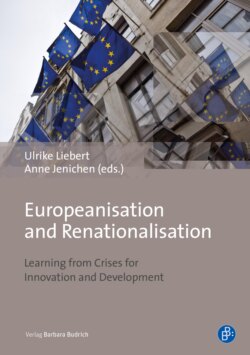Читать книгу Europeanisation and Renationalisation - Группа авторов - Страница 37
На сайте Литреса книга снята с продажи.
2. The economic crisis
ОглавлениеIn May 2010, Greece faced the prospect of a chaotic default, owing to its inability to service its soaring public debt (129 per cent of the GDP in 2009). The first Memorandum of Understanding (MoU), signed between the Greek government and the “Troika” of International Monetary Fund (IMF), European Commission and European Central Bank (ECB) in May 2010 was accompanied by a set of austerity measures in return for necessary loans. However, Greece's public debt kept increasing. As the aims of the first Memorandum were only partly achieved, a similar, second Memorandum was signed between Greece and its creditors in February 2012. Austerity measures produced economic recession and dramatic social consequences (Giannitsis/Zografakis 2015). Compared to the period before the crisis, unemployment and social exclusion soared (Table 1).
Since 2010, successive governments have cut salaries and pensions, raised income and property taxes and rolled back the Greek welfare state. These were the socialist party “Panellinio Sosialistiko Kinima” (PASOK) government in 2009-2011; the coalition government of PASOK and the conservative New Democracy party (ND) which, supported by smaller parties on their right or on their left, stayed in power in 2011-2014; and the Coalition of the Radical Left (Syriza) which won two consecutive elections in January and September 2015 and twice formed a government coalition with the far-right party “Independent Greeks” (Anel). After a short-lived attempt to reverse the Memorandum policies on its own in 2015, the Syriza-Anel coalition government signed another [67] Memorandum with Greece’s creditors and continued the austerity policies of its predecessors. How did civil society react to the welfare retrenchment and economic austerity?
| Table 1. The social consequences of the economic crisis in Greece | ||||
| 2008 | 2013 | 2015 | ||
| Unemployment rate | 8% | 28% | 24% | |
| Youth unemployment | 22% | 59% | 50% | |
| Share of people at risk of poverty or social exclusion | 28% | 35% | 36% | |
| Source: Eurostat, http://ec.europa.eu/eurostat/data/database |
